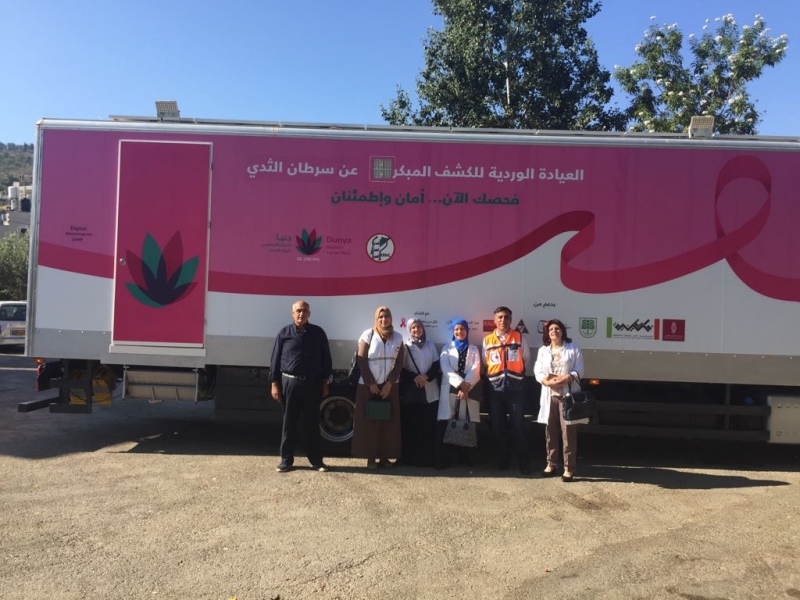
As part of the campaign that was launched by the Dunya Women's Cancer Center (part of the Health Works Committees) and Bank of Palestine's Felestineya Program, together with the World renowned Palestinian Trio Jubran, and the organization of the first musical marathon in Palestine with an aim to spread awareness about the importance of the early detection of breast cancer in Palestine, the Dunya Women's Cancer Center commenced the operation of the mobile pink clinic in the villages northwest of Jerusalem and other areas. The clinic was fully equipped through funds raised from the musical marathon.
This achievement was the result of diligent work over a period of two years to equip and prepare the mobile clinic through funds raised two years ago from the first musical marathon in Palestine, which lasted for 12 continuous hours, led by the Trio Jubran, and through generous contributions from Bank of Palestine, the Arab Fund for Economic and Social Development, Palestinian businessman in the Diaspora Mr. Farouq Al Shami, the Consolidated Contractors Company (CCC), Abd El Mohsen Qattan Foundation, and several other donations from organizations and individuals. On its very first day of operation, the mobile clinic commenced its rounds from the town of Qutna, as part of a framework that will include villages in the area for an entire year.
Dr. Nufuz Maslamani, the Administrative Manager of Dunya Women's Cancer Center, stated that the official launch of the project will take place during a press conference that will involve the participation of all partners, donors and relevant stakeholders. She added that the selection process of the areas of operation was based the needs of these areas, preliminary meetings with local councils, municipalities and grassroots organizations over a period of three months. It was discovered that such work was much-needed in these areas, especially because they suffer from debilitating siege as a result of the stifling apartheid wall, military check points and expansion of settlements over the lands of residents.
Maslamani expressed her gratitude towards the Municipality of Qutna, which provided generous space for the work of the pink mobile clinic, and towards all other municipalities, grassroots organizations, and the College of Nursing at Bethlehem University ( Al Qubeibeh), for their support and willingness to provide all the necessary support for the success of the initiative in the area. She added that prior to the implementation process, a meeting was held between the Dunya Women's Cancer Center, the mayors of Qutna, Qubeibeh and Beit Anan, and the College of Nursing, and they all expressed their interest and complete willingness to provide all the necessary logistics that would contribute to the success of the program, and to serving women in the area.
The pink mobile clinic provides a mammography test, awareness and educational workshops on the importance of the early detection of breast cancer, as well as training women on conducting a regular self-examination, which assists in the detection of changes in the breast in 70% of the cases. Maslamani stated that the Dunya Women's Cancer Center will conduct follow-ups on women patients and beneficiaries, in case the mammography examination indicates that a woman needs to undergo a breast biopsy to diagnose the type of tumor and provide patients with natural treatment and mental support.
Maslamani stressed that the early detection of breast cancer if the first defense line for surviving the illness, whereby global studies indicate that the percentage of cure are over 90% when the cancer is detected at an early stage.
Mr. Rushdi Ghalayini, the General Director of Bank of Palestine, stated that the mobile pink clinic is a special national accomplishment that was achieved as a result of the complementary roles played by various civil society and private sector organizations , with the participation of original Palestinian components who worked hard to promote the health sector in the nation and assist Palestinian women to become aware of the importance of early detection of breast cancer.
Ghalayini added that the bank played an active role in the success of this project, whereby it sponsored events, and made contributions as part of its corporate social responsibility initiative and the Felestineya program. According to Ghalayini, the bank considers Palestinian women as major components in the development of society, and cultural, social and economic development cannot be achieved without the active participation of women and the main role they play in all fields of life.
Yousef Al Faqih, the Mayor of Qutna, thanked the Health Works Committees and the Dunya Women's Cancer Center for their presence in the areas northwest of Jerusalem, and the stance they took alongside citizens and in providing quality services for women. Many women in the area do not follow up on the changes in their bodies, and this results in diseases and sometimes leads to their death. Al Faqih added that the area is in dire need for such services, especially those concerned with women's health and educating them on detecting tumors. He called upon all women citizens of Qutna and the villages northwest of Jerusalem to benefit from the mobile pink clinic in the area.